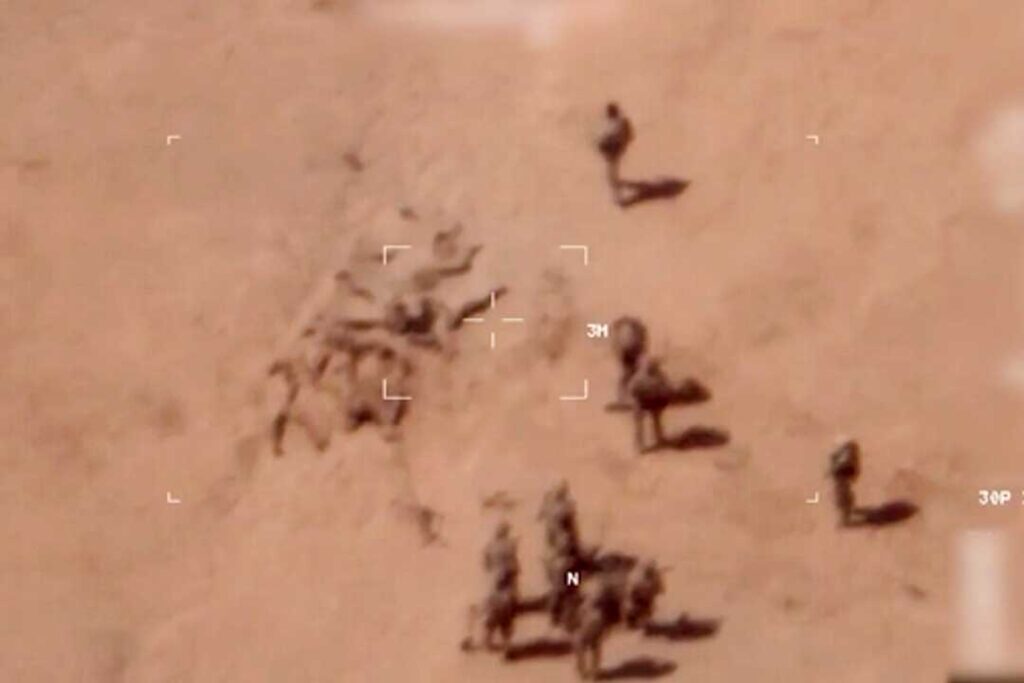ADF STAFF
In a matter of months, Mali’s relationship with much of the outside world has deteriorated profoundly, while Russia is trying to capitalize on a power vacuum it is helping to create.
Experts say it’s all part of the Kremlin’s plan for Africa, using shadowy Wagner Group mercenaries to further its objectives.
Recent developments in Mali highlight those plans.
Russia was under intense international pressure in April after Wagner fighters were accused of slaughtering hundreds of civilians, the same kind of atrocities the group has been accused of in several other African countries.
The French military on April 22 claimed that Wagner mercenaries buried the bodies of Malian civilians near a military base in central Mali in an attempt to stage a massacre they planned to blame on France.
On April 19, France publicly transferred its base in Gossi to Malian forces.
“The same night they [the French military] got footage of Malian soldiers at the base sleeping outside next to Wagner operatives in tents,” journalist Wassim Nasr reported for France 24. “On Thursday [April 21], French surveillance saw Wagner military throwing sand on corpses.”
France also shared posts from what it said was a fake Twitter account that was part of the ploy. The French detailed how their drone watched a Wagner operative filming the hoax and matched the Wagner video and screenshots to the fake Twitter account.
On May 2, Mali’s ruling junta called the French drone flight over the base at Gossi “illegal” and broke defense accords signed in 2014 with France, condemning “flagrant violations” of its national sovereignty.
With hundreds of mercenaries in Mali, Russia stands to gain from the withdrawal of other foreign troops.
Raphael Parens, an independent security researcher who in March published a study entitled “The Wagner Group’s Playbook in Africa,” said the group’s actions on the continent make it clear that the mercenaries are a covert arm of the Kremlin.
“Its status as an independent contractor lends it a certain level of unpredictability while also giving Russia plausible deniability when making foreign policy decisions,” he said during an April 26 online panel hosted by the Foreign Policy Research Institute. “The group can act in a way that’s distant from the state itself, while also giving Russia a tool in building military cooperation with other states.”
Parens’ study outlines Wagner’s three-tiered approach in African countries:
- Conduct disinformation and pro-government campaigns.
- Procure payment via mining concessions to extract natural resources.
- Become enmeshed in national security with bodyguards, military trainers and counter-insurgency advisors.
“Wagner can often fulfill the roles that the Russian state was not willing to cross, whether it came to intervening directly in pro-government repression on the ground, building these economic relationships, getting these direct resources that perhaps the Russian government would have a bit of a harder time doing,” he told Al-Monitor news site.
“In a lot of ways, [Wagner is] doing the dirty work.”
Despite its attempts at mythmaking through propaganda and disinformation, the Wagner Group is not in Africa to liberate people caught in the throes of terrorism and rebellion.
Russian mercenaries are on the continent to further Putin’s regressive, expansionist agenda.
Joseph Siegle, director of research at the Africa Center for Strategic Studies, recently called Wagner a “coercive tool” to undermine democracy and bring countries under Russian influence.
“Wagner is not a counterterrorism force. Wagner is a tool of the Russian government to try and advance its foreign-policy goals,” he told Foreign Policy magazine. “They’re there to keep the junta in power because the junta serves Moscow’s interests in displacing France and the EU [European Union].”
The Wagner Group has thousands of mercenaries deployed in the Central African Republic (CAR), Libya, Mali and Sudan. It has operated in Madagascar and Mozambique as well. It aims to expand into Burkina Faso, which recently was upended by a military coup, and is said to be eyeing the volatile Democratic Republic of the Congo.
Russia signed a military agreement with Cameroon in April to collaborate in the fields of defense and security policy, troop training, military education, medicine, and topography.
Putin’s footprint on the continent continues to expand, as more African countries experience coups and become dictatorships.
Russia sees many opportunities to support authoritarian leaders and undermine democratic order, Siegle said.
“Russia can’t compete very well in that order,” he told Al-Jazeera. “If democracy is held up as the ultimate aspirational governance model, then that is constraining for Russia.”

